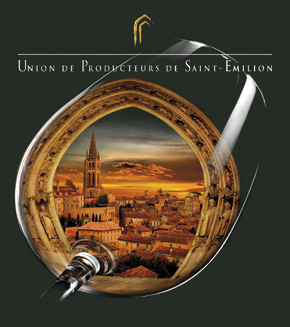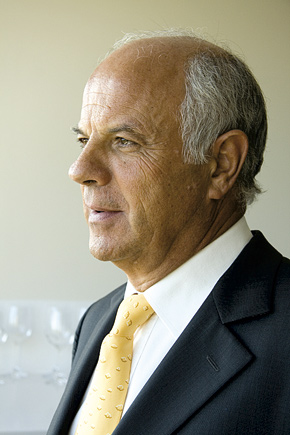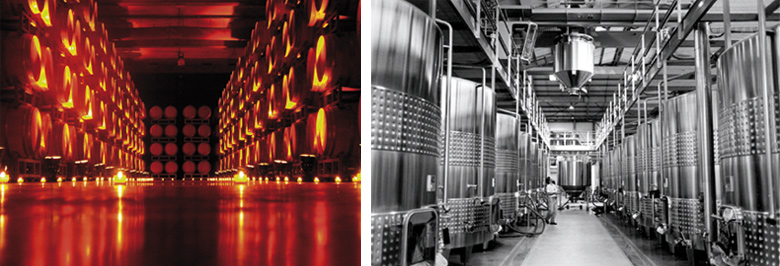Winegrower Bordeaux
Union des Producteurs de Saint-Emilion :
A success story
In the context of far-reaching global competition leading wine producers are involved in, it is clearly essential for Old World producers to guarantee the quality of their wines by ensuring 100% traceability. To wage this trade battle, technological and commercial innovations are the arms preferred by the Union de Producteurs de Saint-Emilion (UDPSE). A policy of individual winemaking and a segmented business strategy have turned this “cellar” away from purely financial considerations and removed its reputation of being a producer of low-end-of-the-range wines. Since 2000, the simple cooperative cellar the UDPSE was at the origin has successfully extended its activities in view of promoting the appellation (or at least the 14% it represents) and ensuring that its wines are given an excellent position on supermarket shelves.


Alain Naulet Managing Director of the UDPSE, is also Vice-Chairman of the Conseil des Vins de Saint-Emilion and administrator of the Fédération des Grands Vins de Bordeaux, as well as of the CIVB (Bordeaux Wine Trade Council)
In the space of just a few years, it has revealed itself to be a tremendous resource for its members who benefit from an efficient system and an integrated network, whilst making significant savings. This is due to the fact that the UDPSE draws upon a network of 190 winemakers who must comply with precise vine growing specifications set out by the Union, and it employs 48 members of staff, including a sales team comprised of eight people.
Alain Naulet, Managing Director of the UDPSE, is also Vice-Chairman of the Conseil des Vins de Saint-Emilion and administrator of the Fédération des Grands Vins de Bordeaux, as well as of the CIVB (Bordeaux Wine Trade Council). His career within the Saint-Emilion cooperative cellar is quite unusual: he began as administrator in 1990 and became Chairman in 2000. Subsequently he took over its management at the end of 2002, in order to give impetus to the strategy set out by the Board of Directors. Initiator of developments, manager, visionary.... Alain Naulet gives us the details of the rapid expansion of this cooperative cellar and can quite rightly be proud of the first results.
Priority for productive investment
In 1999, the Board of Directors began discussions and it soon became clear that it was urgent to renew production equipment and all existing structures: setting up temperature-control for vats, as well as a system of using natural gas to reduce oxidation, and ensuring repairs for vats... Since 2003, the UDPSE can pride itself on possessing a vat house that uses gravity and on this scale it is undoubtedly unique worldwide. Extremely complex, both in size and design, this vat house can deal with a total of 20 000 hectolitres and houses 141 vats of small capacity, ranging from 100 to 150 hectolitres (an investment of 8.5 Million Euros). This new installation was created to work alongside traditional cement vats with a total capacity of 200 000 hectolitres.
3 million Euros were released for repairs; a further 3 million Euros were also allocated in 2001 for the purchase of 2.5 hectares in Vayres and the construction of a refrigerated warehouse of 6 000 m² to enable the storage of 7 million bottles; these premises also house a bottling and packaging line on a platform measuring 700 m², from which wines are dispatched.
Since wine maturation is another priority, the Union has also concentrated its efforts on improving its barrel storehouse, which now holds 5 200 barrels. Repairs were made to the bottling line, completing the renovation process. The wine is bottled at the Saint-Emilion site, before being transported to the Union’s premises in Vayres.
With 15 million Euros allocated for investments since 2000, the Union is now benefiting from a period of respite and invests no more than 1 million Euros annually, using these funds mainly for repairs in the vat houses, for flooring, the laboratory and the reception area.

The UDPSE today, in figures
The UPDSE has an annual production of 40 000 hectolitres of wine, which comes from 800 hectares of vineyards located all over the appellation. 4.6 million bottles (80% of total production, including all appellations) are sold each year; 80% is sold directly by the UDPSE. 60% is sold in France, and 40% is exported (compared with 27% in 2002). The UDPSE’s aim is to increase export sales to 50%. Due to the sharp decrease in consumption in France, professionals are starting to set up more efficient strategies for export sales. The UDPSE has a sales manager for Asia, another who is responsible for northern Europe and a third who deals with Anglo-Saxon countries (United States, Canada and Great Britain).
80% of production is sold in hypermarkets and supermarkets, 15% in traditional channels (wine shops, cafés, hotels and restaurants) and 5% is sold to individual customers (mail order, online wine shop, or directly from the cooperative cellar in Saint-Emilion). Faced with growing economic challenges, the executive board has confirmed the UDPSE’s capacity to produce a wide range of wines with eight different brand names, three of which are Great Growths and fifty estate wines.
Beneficial reforms
The managers of the UDPSE can now make a positive assessment of its policy. Firstly, membership conditions have changed: since 2006, the Union now allows vine growers to sell just a proportion of their harvests. Compliance with the cooperative’s specifications ensures differentiated payment for members according to the way in which they maintain their vineyards and the quality of grapes they provide. Vine growers can now be extremely satisfied with the position held by their cooperative cellar within the appellation, as well as on international markets. “We have simultaneously ensured that a boost has been given to winegrowing in general within the appellation and to our cooperative cellar” Alain Naulet concludes.
Bolstered by these results, the UDPSE has set up a SCEA (agricultural company), which enables it to make land investments and has recently taken an estate of 4.5 hectares on a tenant-farming basis. Most importantly, in 2005 the UDPSE set up a wine merchant company named ArteVino. This subsidiary, which belongs wholly to the UDPSE, sells wines from all appellations and in fact assists customers in finding wines in appellations other than Saint-Emilion. The structure of this business enables it to buy wines locally and then group wines produced at the cooperative cellar along with those from the wine merchant company.
Investments targeted for production, stringent standards required for quality, a sales strategy aimed to satisfy the requests of an increasingly international clientele...For both the UDPSE and the entire jurisdiction of Saint-Emilion this winning combination admirably demonstrates the dynamism of wine producers in the Old World!
Christelle Faure-Némery
Les marques de l’UDPSE
Saint-Émilion grand cru : •
Aurélius (cette marque créée en 2000 relève d’un cahier des charges spécifique et fait l’objet d’une vinification séparée avec 100% de barriques neuves. Il s’agit d’un assemblage de vins issus des plus nobles terroirs de la juridiction).
•
Galius (sélection de parcelles également)
•
Côtes Rocheuses (une marque datant de 1949)
Saint-Émilion :
•
Royal Saint-Émilion (première marque de la cave créée en 1933 et reprise en 2003)
• Andeli
Bordeaux :
• Emilio
• Lahire
Côtes de Castillon : • Roy Charles
L’Union de Producteurs de Saint-Emilion s’est également engagée dans une politique de respect des différentes normes. La cave et son vignoble ont reçu les agréments pour ISO 2000, IFS, BRC, HACCP et Agri-Confiance.
UDPSE
BP 27
33330 Saint-Émilion
T. 05 57 24 70 71
www.udpse.com


